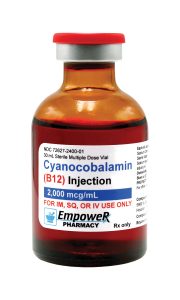
General Information: Cyanocobalamin, or vitamin B12, is a B-vitamin. It is found in a variety of foods such as fish, shellfish, meats, and dairy products. Although cyanocobalamin and vitamin B12 are terms used interchangeably, vitamin B12 is also available as hydroxocobalamin, a less commonly prescribed drug product (see Hydroxocobalamin monograph). Cyanocobalamin is available nasally, orally, and parenterally, and is equal in biologic activity to hydroxocobalamin. Cyanocobalamin is used to treat pernicious anemia and vitamin B12 deficiency, as well as to determine vitamin B12 absorption in the Schilling test. Vitamin B12 is an essential vitamin found in the foods such as meat, eggs, and dairy products. Deficiency in healthy individuals is rare; the elderly, strict vegetarians (i.e., vegan), and patients with malabsorption problems are more likely to become deficient. If vitamin B12 deficiency is not treated with a vitamin B12 supplement, then anemia, intestinal problems, and irreversible nerve damage may occur. Oral therapy is not always effective, as some persons lack intrinsic factor, an endogenous substance produced by the stomach and necessary for oral B12 absorption. Other patients may not be able to absorb oral vitamin B12 due to surgical removal or dysfunction of the intestines in the area where absorption of vitamin B12 occurs. Thus, parenteral or nasal therapy may be needed; however, intranasal therapy should only be instituted for maintenance treatment after control of the condition has been obtained by the parenteral route. Vitamin B12 is used to treat pernicious anemia and vitamin B12 deficiency, as well as to determine vitamin B12 absorption in the Schilling test. Cyanocobalamin was approved by the FDA in 1949. The intranasal metered gel solution form (Nascobal®) was approved in November 1996 for vitamin B12 deficiency resulting from various conditions; in 2002, such conditions were expanded to include use in vitamin B12-deficient patients with HIV infection, AIDS, or Crohn’s disease. An intranasal spray solution of B12, also called Nascobal®, with the same indications, was FDA approved in January 2005. Another intranasal spray, CaloMist™, was approved July 2007 for maintenance therapy after normalization with IM vitamin B12.
Contraindications/Precautions: Who should not take this medication? Patients with early hereditary optic nerve atrophy, cyanocobalmin hypersensitivity, and those who are pregnant. Your health care provider needs to know if you have any of these conditions: kidney disease; Leber’s disease; megaloblastic anemia; an unusual or allergic reaction to cyanocobalamin, cobalt, other medicines, foods, dyes, or preservatives; pregnant or trying to get pregnant; breast-feeding.
Cyanocobalamin is contraindicated in patients with cyanocobalamin hypersensitivity or hypersensitivity to any of the medication components. Cyanocobalamin is also contraindicated in patients with cobalt hypersensitivity because cyanocobalamin contains cobalt. In the case of suspected cobalt hypersensitivity, an intradermal test dose should be administered because anaphylactic shock and death have followed parenteral administration of cyanocobalamin.


